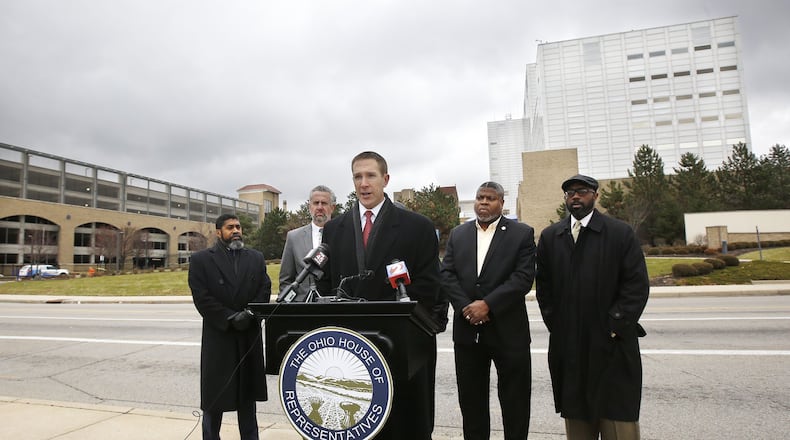MORE: Health system, which owns Premier Health stake, close to mega-merger
The bill was developed in response to Premier Health’s plan to tear down Good Sam in northwest Dayton and block the property from being used in the future for in-patient care, said Butler at a Monday press conference across the street from the Good Sam property.
“Premier’s actions are just wrong. They are the opposite of charity,” Butler said. “Our legislation aims to fix this injustice.”
A Premier Health spokesperson, however, said the proposed bill could seriously harm health care systems across the state by directly interfering with their ability to improve care.
“It is imperative that health care providers possess the liberty, without government interference, in finding new and innovative ways to provide care, which may include less inpatient beds and large brick and mortar facilities,” the spokesperson said.
State Rep. Niraj Antani, R-Miamisburg, opposes the bill, saying it would be a massive tax increase on any health system that decides to close a hospital or health facility.
“President Barack Obama would be proud of this bill. It increases government control of healthcare by a staggering amount,” Antani said. “The bill may as well be named Obamacare 2.0.”
MORE: Health system, which owns Premier Health stake, close to mega-merger
In July, Good Sam hospital shut its doors for good after more than 85 years in operation.
Premier Health officials said the hospital was operating at half its capacity and health care services were available less than five miles away at another of its facilities, Miami Valley Hospital.
Premier Health is a nonprofit charity, and true charities don’t have to pay taxes because they provide a great value to society by serving those most in need, Butler said.
But Premier Health has acted exactly like a profit-driven business in its decision to close Good Sam, he said.
Premier wants to tear down the Good Sam facility and put a deed restriction on the property to prevent new owners from opening facilities that would have in-patient hospital beds on the site, Butler said.
The health care system was only the operator of Good Sam but recently bought the property as part of a “scorched earth” strategy to stop direct competitors from moving to the site, he said.
But Butler says his bill would require health care networks that want to demolish hospitals in the state to first offer the facilities to the cities and counties in which they are located for $1.
The price would be higher if the land under the hospitals are worth more than the buildings.
MORE: Empty beds more common in area hospitals
If the city or county does not purchase the hospital, they would have to vote to allow the demolition.
If the city or county does not buy the property or approve demolition, the hospital would have to be put up for public auction, the bill says.
Bidders would have to agree to use the hospital at 90 percent of its previous capacity, and would be required to pay property taxes in escrow until they reach the 90 percent benchmark. The taxes collected would be returned when the 90-percent requirement is met.
If no qualifying bids are made, the hospital network can demolish the closed hospital without penalty, Butler said.
However, health care systems that demolish a hospital without first following those steps would be treated as a for-profit entity for 20 years. The systems would be subject to property, sales and commercial activity taxes.
The bill’s requirements are retroactive to Jan. 1, 2018. Rep. Mike Henne, R-Clayton, is a cosponsor.
This bill can help slow down and may even stop Premier from demolishing the hospital and taking health care away from people who desperately need it, said Rev. Rockney Carter Sr., president of the Clergy Community Coalition.
Premier Health for years have been the largest provider of uncompensated adult care in the region, and providing that level of “charity care” means the system must have the flexibility to provide care in new, innovative and effective ways, a spokesperson said.
The spokesperson said that bill threatens that flexibility. Premier Health also said it would restrict hospital services on the site but it is not forbidding all medical services.
Changes in the health care system coupled with government reimbursements below the cost of service has caused hospitals to consider closure or service reductions, said John Palmer, spokesman with the Ohio Hospital Association.
“Requiring these entities to pay taxes only adds to the ongoing financial stresses of hospitals that service our communities, and will result in increased health care costs at a time when hospitals are focus on reducing costs and finding efficiencies,” he said.
Three hospitals closed in Ohio this year, and there were also service reductions.
About the Author

